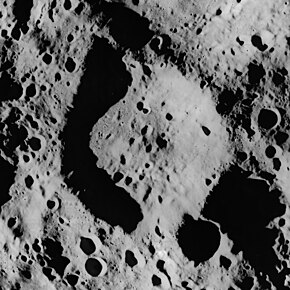Pirquet (crater)
Appearance
 Apollo 17 image | |
| Coordinates | 20°18′S 139°36′E / 20.3°S 139.6°E |
|---|---|
| Diameter | 65 km |
| Depth | Unknown |
| Colongitude | 221° at sunrise |
| Eponym | Guido von Pirquet |


Pirquet is an eroded lunar impact crater that lies to the northwest of the larger crater Levi-Civita on the far side of the Moon. About three crater diameters to the west is the prominent Tsiolkovskiy. To the north-northeast of Pirquet is Denning.
The rim and interior of Pirquet are marked by a number of small craterlets. A small crater is protruding into the inner wall along the south-southeastern side. This crater is slightly elongated along the east–west direction, making it appear slightly oval.
Satellite craters
By convention these features are identified on lunar maps by placing the letter on the side of the crater midpoint that is closest to Pirquet.
| Pirquet | Latitude | Longitude | Diameter |
|---|---|---|---|
| S | 20.6° S | 137.7° E | 30 km |
| X | 17.2° S | 138.5° E | 17 km |
References
- Andersson, L. E.; Whitaker, E. A. (1982). NASA Catalogue of Lunar Nomenclature. NASA RP-1097.
{{cite book}}: Invalid|ref=harv(help) - Blue, Jennifer (July 25, 2007). "Gazetteer of Planetary Nomenclature". USGS. Retrieved 2007-08-05.
{{cite web}}: Invalid|ref=harv(help) - Bussey, B.; Spudis, P. (2004). The Clementine Atlas of the Moon. New York: Cambridge University Press. ISBN 978-0-521-81528-4.
{{cite book}}: Invalid|ref=harv(help) - Cocks, Elijah E.; Cocks, Josiah C. (1995). Who's Who on the Moon: A Biographical Dictionary of Lunar Nomenclature. Tudor Publishers. ISBN 978-0-936389-27-1.
{{cite book}}: Invalid|ref=harv(help) - McDowell, Jonathan (July 15, 2007). "Lunar Nomenclature". Jonathan's Space Report. Retrieved 2007-10-24.
{{cite web}}: Invalid|ref=harv(help) - Menzel, D. H.; Minnaert, M.; Levin, B.; Dollfus, A.; Bell, B. (1971). "Report on Lunar Nomenclature by the Working Group of Commission 17 of the IAU". Space Science Reviews. 12 (2): 136–186. Bibcode:1971SSRv...12..136M. doi:10.1007/BF00171763.
{{cite journal}}: Invalid|ref=harv(help) - Moore, Patrick (2001). On the Moon. Sterling Publishing Co. ISBN 978-0-304-35469-6.
{{cite book}}: Invalid|ref=harv(help) - Price, Fred W. (1988). The Moon Observer's Handbook. Cambridge University Press. ISBN 978-0-521-33500-3.
{{cite book}}: Invalid|ref=harv(help) - Rükl, Antonín (1990). Atlas of the Moon. Kalmbach Books. ISBN 978-0-913135-17-4.
{{cite book}}: Invalid|ref=harv(help) - Webb, Rev. T. W. (1962). Celestial Objects for Common Telescopes (6th revised ed.). Dover. ISBN 978-0-486-20917-3.
{{cite book}}: Invalid|ref=harv(help) - Whitaker, Ewen A. (1999). Mapping and Naming the Moon. Cambridge University Press. ISBN 978-0-521-62248-6.
{{cite book}}: Invalid|ref=harv(help) - Wlasuk, Peter T. (2000). Observing the Moon. Springer. ISBN 978-1-85233-193-1.
{{cite book}}: Invalid|ref=harv(help)
